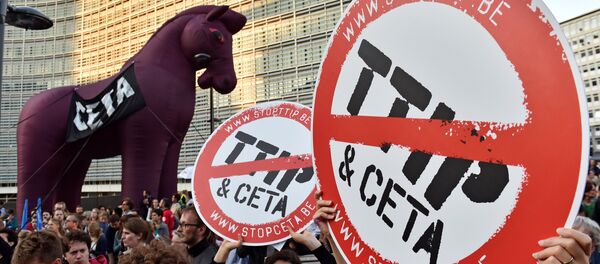However, CETA — along with the Transatlantic Trade and Investment Partnership (TTIP) proposed trade deal with the US — has come in for criticism for lowering regulatory standards in the EU, which tend to be tighter for food production and preparation, agriculture, pharmaceuticals and the environment.
Central to the trade agreements is the principle that, if EU states' regulatory policies preclude non-EU countries from selling their goods or services, the company can sue for loss of earnings under the Investor State Dispute Settlement (ISDS) system, which is a trade tribunal separate form member states' judiciaries.
More than 200 people in front of special session of EU Council to say #StopCETA #WallonsTenezBon#RebootDemocracy pic.twitter.com/DHnAMKNgks
— Pascoe Sabido (@pascoesabido) 18 October 2016
Nick Dearden, director of Global Justice Now, told Sputnik: "CETA has been stalled for 2 years now, because European and Canadian citizens have clearly said they don't want this toxic trade deal which was negotiated behind closed doors. As a result, a number of countries have still said they might not vote for it. We urge those governments to follow through on this.
"It has become increasingly clear that the EU's entire trade policy needs to be re-examined. Trade should be about helping sell goods to other countries in a way that benefits both parties. But deals like TTIP and CETA are actually about giving huge new powers to big business, as 101 law professors from across Europe confirmed in an opinion released today. It looks like TTIP is dead — let's make sure CETA follows it. "
Wallonia Knockback
Meanwhile, Germany's Economy Minister Sigmar Gabriel — speaking ahead of the meeting in Luxembourg, October 18 — said: "I don't think the agreement can fail, but Belgium and Romania, for example, still have questions that perhaps can be answered today. Perhaps we need a bit more time."




